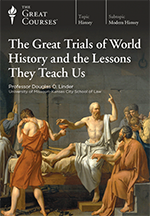
By: James G. Apple, Editor-in-Chief, International
Judicial Monitor
I have been a subscriber and user of “The Great Courses”
offered by The Teaching Company over a period of fifteen years. The Teaching
Company, located in Chantilly, Virginia, was founded in 1990 Thomas M. Rollins,
a graduate of the Harvard Law School. The Teaching Company offers the Great
Courses” using a series of lectures on a selected topic. The topics cover almost the entire
range of liberal arts learning, from history and philosophy to physics and
astronomy, as well as many courses that deal with practical matters, such as photography,
entrepreneurship, woodworking, and painting. A course consists of series of
lectures that are usually one-half hour in length. Courses may consist of 12
lectures, or 24 lectures or even 64 lectures. The courses are taught by the
best professors or experts in a particular field. The professors are usually those who have been given “Best
Teacher” awards from their respective colleges or universities. My usual fare
of courses have dealt with history, biography and science.
Recently I came across a new title, “The Great Trials of World
History and the Lessons They Teach Us,” taught by Professor Douglas O.
Linder of the University of Missouri – Kansas City School of Law. He has
received his law school’s highest teaching award twice. I decided that Professor
Linder’s course of 24 lectures would be a good investment for learning more
about trials, judges and courts and ordered it.
The lectures in this particular Great Courses cover trials
beginning with that of Socrates in 399 B.C.E. and ending with the O.J. Simpson
trial in 1995. Professor Linder, in the Introduction to the course guidebook
which accompanied the two DVDs, said a constant question in studying the
different trials is “Was justice done?” He concludes the introduction with this
observation:
The course as a whole will be far-reaching and
kaleidoscopic, revealing how societies across the globe throughout
history have used trials to resolve key issues and decide the fates of
evildoers, abuser of powers, champions of free speech and innocent people
caught in the wrong place at the wrong time. We will end our tour of great
trials with thoughts about how famous trials can educate, entertain and
still resolve questions of guilt and innocence – and thus come to an
understanding of what makes a trial a great trial.
One may ask at this point, what can judges learn from
reading about these great trials. The answer is there are many specific lessons and
insights that can be learned by judges about many of the great trials included
in the series. They are:
Conducting trials in one day – the
Trial of Socrates
The dangers of corruption in the
conduct of trials when the citizens of a country have lost
confidence in the judicial process-how to conduct a corruption trial -
the Trial of Gaius Verres
The conduct of a trial involving false
charges made by government or political figures – the Trial of Sir Thomas More
The dangers and pitfalls of
religious trials and trials of controversial citizens - the Trial of Giordano
Bruno
Trials involving hysterical
testimony, dangers of judges biased by religious beliefs or fervor – the
Salem Witch Trials
Handling a case where public
sentiment is strong against the defendants – the Boston Massacre Trial
Conspiracy as a basis for criminal
convictions – the Aaron Burr Conspiracy Trial; the Lincoln Assassination Trial
Handling trials with strong racial
or ethnic issues – the Amistad Trials, the Dakota Conflict Trials, the Trial of
Louis Riel, the Trial of the Scottsboro Boys, the Mississippi
Burning Trial
Trials involving sexual deviancy –
the Three Trials of Oscar Wilde
A trial in an appellate court - the
trial of Sheriff Joseph Shipp
Handling a death penalty case – the
Leopold and Loeb Trial
Handling a case involving religious
convictions and conflict between religion and science – the Scopes
Monkey Trial
Cases involving crimes committed
while holding government office; individual responsibility for acts
taken as government officials; responsibility for acts
in violation of international law – the Nuremberg Trials
Trials involving perjury issues –
the Alger Hiss Trial
Trials involving allegations of
insurrection and violence against government – the Nelson Mandela
Trial; the Trial of the Chicago Eight
Handling trials involving child
molestation – the McMartin Preschool Abuse Trial
Judges keeping control of notorious
cases – the O.J. Simpson Trial
The entire course is ready made for a judge seminar or
round-table discussion of the cases and their relevance to judicial life. The
course comes with guidebook that provides a synopsis of each lecture, together
with a list of questions to consider for those who want to discuss the trials
with colleagues or participate in a seminar.
The web site for The Teaching Company and The Great Courses
is www.thegreatcourses.com where information about the 690 courses and their costs can be found. The Teaching Company also offers these
courses in a streaming format for computers and tv/video.

 International
Judicial Monitor
International
Judicial Monitor